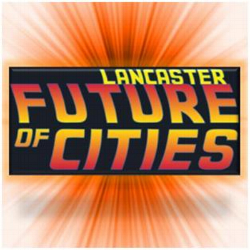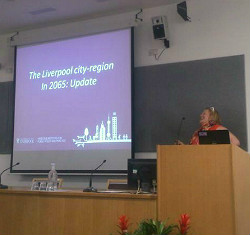As part of our evidence-gathering, the lead expert group and project team has engaged with a number of UK cities to hear directly from them about their views on the future.
The process began almost a year ago with a series of city visits, led by Sir Mark Walport and Sir Alan Wilson. We met with representatives of local authorities, business, civic society and academia in round-table meetings that generated valuable insights into opportunities and barriers, as seen from a local perspective. We invited each city group to follow up afterwards by creating their own future-looking ideas, or ‘city visions’.
On 12 September we held a meeting to bring together the various cities and their city visions. Held in a windowless room in the basement of BIS, the all-day event was lit from within by a series of engaging presentations from Lancaster, Newcastle, Liverpool, Milton Keynes, Cardiff, London and Cambridge. Each city reported back on its progress to date.

What struck me about the presentations was the diversity of approaches being taken. There is more than one way to envisage the future and we were entertained with a range of ideas. These included Lancaster’s recently launched competition for young and old people to picture the future city. Led by the Chamber of Commerce and with a Back to the Future branding, the competition builds on the efforts of the city to hear the voice of local people. Watch this space then for hoverboards, a Delorean and the comeuppance of a bully named Biff. Or, most likely, something entirely new, because Lancaster’s work is grounded in the reality of local people’s concerns about the future and a strong sense of place.
Newcastle’s future visioning is being coordinated by Newcastle City Futures. Mark Tewdwr-Jones at the University of Newcastle described the programme of highly attended public events that have been held. The numerous views raised in these are being assembled and analysed using the Delphi technique of theme mapping. This analysis will lead to the creation of several scenarios to articulate different futures for the city. Delphi mapping is also being used in Liverpool in an effort to harness “the network effort of thinking together”. Dr Nicola Headlam of the Heseltine Institute at the University of Liverpool presented a 3-part approach incorporating:
- analysis of different views
- futures thinking
- participation

Indeed the measurement and modelling of networks came up time and again during the day in contributions from the Future Cities Catapult, Design Council - CABE and Milton Keynes. How can physical, spatial, social and digital networks be better understood and harnessed? The importance of spatial connectivity on the cost of travel was highlighted - participants reported research which indicates that people in sprawling networks spend 14% of income on travel whereas people in connected street layouts spend only 4%.
The importance of skilled leadership was described by representatives from UCL’s Science, Technology, Engineering and Public Policy department (STEaPP). The theme proved popular with attendees and the room was introduced to a new acronym - ‘VUCA’ - which describes the combination of difficult challenges facing cities:
- Volatility
- Uncertainty
- Complexity
- Ambiguity
The various group and plenary discussions during the day raised a number of further challenges, including the ability of organisations to undertake long-term, systems thinking and the need to do the important things well. One phrase that resonated for me was the need for organisations to switch from a ‘command and control’ mindset to a systems approach. Undoubtedly easier said than done but a valuable provocation along with so many other useful insights from the day.
Featured image of driverless pods in Milton Keynes courtesy of the Department for Business, Innovation and Skills.
Sign up for email alerts from this blog, or follow us on Twitter.
